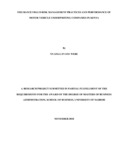| dc.contributor.author | Nyanga, Evans; W | |
| dc.date.accessioned | 2019-01-24T12:25:21Z | |
| dc.date.available | 2019-01-24T12:25:21Z | |
| dc.date.issued | 2018 | |
| dc.identifier.uri | http://hdl.handle.net/11295/105466 | |
| dc.description.abstract | Insurance fraud is a challenge facing almost all insurance firms whether in the developing or
developed world. Indeed, in most of Kenya’s motor underwriting companies, fraud has evolved
over time from fake windscreen and radio/music systems to more advanced total loss of
vehicles and death claims. For the motor commercial segment, cases where the numbers of
claimants surpass the carrying capacity of a vehicle or involving multiple insurances has been
made. The objective of this study was to determine the effect of insurance fraud risk
management practices on the performance of motor vehicle underwriting firms in Kenya. The
study used fraud management life cycle theory and fraud triangle theory in defining the
relationship between insurance fraud risk management practices and performance of motor
vehicle underwriting companies in Kenya. Motor vehicle underwriting companies are faced
with the task of managing fraud risk which has been a menace to their performance. A
descriptive research design was used for the study with a target population of thirty five motor
vehicle underwriting companies. The study found out that there was a significant relationship
between preventive, detective & responsive fraud practices and performance of motor vehicle
underwriting companies in Kenya. The study concluded that all the independent variables
influence firms’ performance in accordance to the regression results. From the findings and
conclusions, the study recommends that motor vehicle underwriting companies should
carefully deliberate the extent to which they adopt the various fraud risk management practices
since the study established that they affect the firms’ performance differently. The study
therefore recommends that insurance fraud risk management practices should be made
fundamental business practise by motor vehicle underwriting companies in Kenya. The Rsquared
was calculated at 72 percent on the four variables. The P value of 0.00 confirmed that
the regression model significantly and statistically predict the dependent variable and this a
good fit for the data. Preventive measure was practiced by majority of the firms and this was
confirmed by the t of 2.605 and beta of 0.613. The study recommends that motor vehicle
underwriting companies should carefully deliberate the extent to which they adopt the various
fraud risk management practices since it has been proven from the study that they affects firms
performance differently and the top management should fully support insurance fraud risk
detective polices by allocating resources to the process to ensure that there is regular
review.The researcher suggest that it would be worth a study if findings from this study are
applicable to other industries for example manufacturing or banking in Kenya to identify how
risk management practices affect them. The study further suggest for further research on the
remaining 28 percent of factor that affect performance of motor vehicle under writing
companies in Kenya | en_US |
| dc.language.iso | en | en_US |
| dc.publisher | University of Nairobi | en_US |
| dc.rights | Attribution-NonCommercial-NoDerivs 3.0 United States | * |
| dc.rights.uri | http://creativecommons.org/licenses/by-nc-nd/3.0/us/ | * |
| dc.subject | Insurance Fraud Risk Management Practices and Performance of Motor Vehicle Underwriting Companies in Kenya | en_US |
| dc.title | Insurance Fraud Risk Management Practices and Performance of Motor Vehicle Underwriting Companies in Kenya | en_US |
| dc.type | Thesis | en_US |



